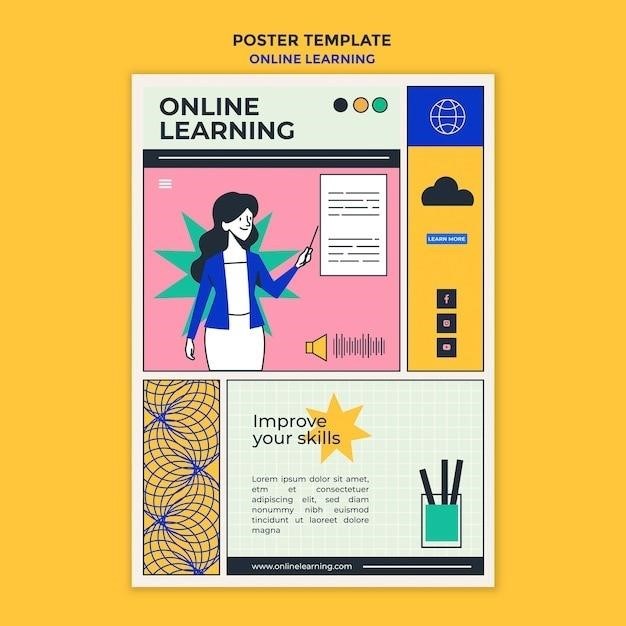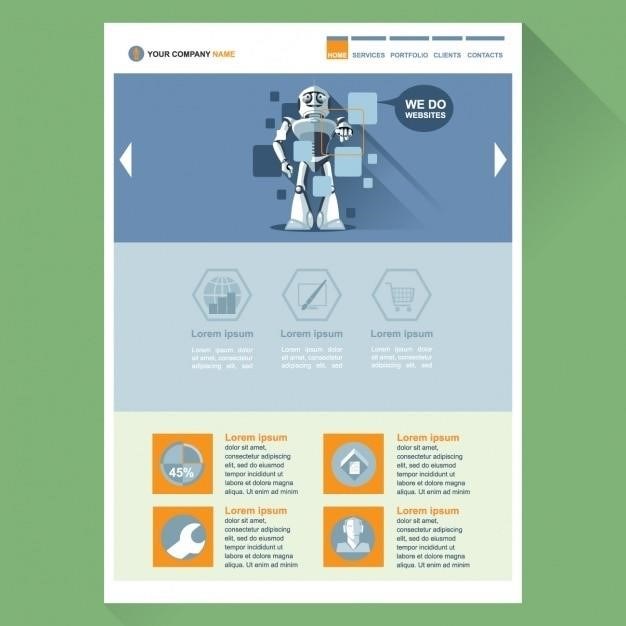AI Study Guide Maker from PDF⁚ A Comprehensive Guide
Transform your PDFs into effective study guides effortlessly. Leverage AI’s power for intelligent summarization‚ key point extraction‚ and personalized learning experiences. Unlock your academic potential.
In today’s fast-paced academic world‚ students face the constant challenge of efficiently processing vast amounts of information. Traditional study methods often fall short‚ leaving students overwhelmed and struggling to retain key concepts. This is where AI-powered study tools emerge as invaluable assets‚ offering innovative solutions to streamline the learning process. These tools leverage cutting-edge technologies like natural language processing (NLP) and machine learning to analyze complex texts‚ extract core information‚ and present it in easily digestible formats. Imagine transforming dense PDFs into concise‚ personalized study guides tailored to your individual learning style. This isn’t science fiction; it’s the reality that AI-powered study guide makers offer. By automating time-consuming tasks such as summarization and note-taking‚ these tools free up valuable time for deeper engagement with the material. They also enhance understanding through interactive features such as quizzes and flashcards‚ fostering active recall and knowledge retention. The efficiency and personalization offered by AI-powered tools are revolutionizing how students approach learning‚ leading to improved academic performance and a more enjoyable study experience. The benefits extend beyond simply creating study guides; they empower students to become more effective and engaged learners.
II. Choosing the Right PDF for AI Processing
The success of AI-powered study guide creation hinges significantly on the quality of the input PDF. Before feeding your document to an AI tool‚ consider several crucial factors. Firstly‚ ensure the PDF is well-formatted and free from significant errors. Poorly scanned documents or those with inconsistent formatting can hinder accurate data extraction. Ideally‚ the PDF should be a clear‚ digitally-created document‚ rather than an image-based scan. Secondly‚ the document’s content plays a vital role. A PDF filled with irrelevant information or complex‚ ambiguous language will produce a less effective study guide. Pre-processing the PDF to remove unnecessary elements or to clarify ambiguous phrasing can significantly improve the AI’s performance. Consider breaking down large PDFs into smaller‚ more manageable chunks for optimal processing. This ensures the AI can focus on smaller‚ more coherent sections of text‚ resulting in a higher quality study guide. Finally‚ be mindful of the file size. Excessively large files may take longer to process or might exceed the processing capabilities of certain AI tools. Optimizing your PDF for size and clarity before processing ensures a smoother‚ more efficient workflow and better results.
A. PDF Quality and Format Considerations
The quality and format of your PDF significantly impact the AI’s ability to accurately extract and process information. Avoid using scanned images of text; OCR (Optical Character Recognition) can introduce errors. Preferably‚ use PDFs created directly from digital documents‚ ensuring clean‚ clear text; Inconsistent formatting‚ like varying font sizes‚ styles‚ or unusual spacing‚ can confuse the AI. Strive for a consistent and clean layout. Consider pre-processing your PDF to correct any formatting issues before feeding it to the AI. This might involve using a PDF editor to standardize fonts‚ remove unnecessary graphical elements‚ and ensure consistent paragraph spacing. Furthermore‚ the presence of tables‚ complex equations‚ or unusual symbols can pose challenges for AI processing. While some AI tools handle these elements effectively‚ others might struggle. You may need to manually reformat these sections or consider simplifying the content before AI processing. The clearer and more consistent your PDF‚ the more accurate and efficient the study guide generation process will be. Remember‚ a well-prepared PDF is the foundation of a high-quality study guide.
B. Data Extraction Challenges and Solutions
Extracting data from PDFs accurately can present several challenges. Complex layouts‚ including multiple columns or embedded images‚ can confuse AI algorithms‚ leading to inaccurate or incomplete data extraction. The presence of headers‚ footers‚ or watermarks can also interfere with the process. Furthermore‚ variations in font styles‚ sizes‚ and colors within the document may hinder accurate text recognition. Poorly scanned documents or images embedded within the PDF can significantly reduce the accuracy of data extraction. To mitigate these challenges‚ consider using pre-processing techniques to clean up your PDF before feeding it to the AI. This might involve using a PDF editor to remove irrelevant elements‚ standardize fonts‚ and improve the overall readability. Selecting an AI tool specifically designed for robust PDF processing is crucial. Look for tools with advanced OCR capabilities and the ability to handle complex layouts and formatting. Experiment with different AI tools to find one that best handles the specific characteristics of your PDFs. If accuracy remains a concern‚ manually review and correct the extracted data before using it to create a study guide. The effort invested in pre-processing and tool selection will greatly enhance the overall accuracy and effectiveness of the study guide generation process.
III. Leveraging AI for Study Guide Creation
AI significantly streamlines study guide creation from PDFs. Instead of manually combing through lengthy documents‚ AI tools can rapidly process the text‚ identify key concepts‚ and structure the information into a coherent and easily digestible format. This automation saves significant time and effort‚ allowing students to focus on understanding the material rather than spending hours creating study aids. Advanced AI algorithms can analyze the text to identify important terms‚ definitions‚ and examples‚ ensuring that the study guide focuses on the most relevant information. Many AI-powered study guide makers offer customization options‚ allowing users to adjust the level of detail‚ the type of output (e.g.‚ outlines‚ summaries‚ flashcards)‚ and the specific topics to be included. This flexibility ensures that the resulting study guide aligns perfectly with individual learning styles and preferences. Furthermore‚ some AI tools can automatically generate quizzes or practice questions based on the extracted content‚ providing a valuable tool for self-assessment and reinforcement of learning. The integration of AI dramatically enhances the efficiency and effectiveness of studying‚ ultimately leading to better learning outcomes.
A. Key Features of AI-Powered Study Guide Makers
Effective AI study guide makers offer a range of features designed to simplify and enhance the learning process. Central to their functionality is the ability to accurately extract text from various PDF formats‚ handling different layouts and complexities with ease. Beyond simple extraction‚ these tools incorporate advanced Natural Language Processing (NLP) to analyze the extracted text‚ identifying key concepts‚ summarizing paragraphs‚ and extracting definitions. Many platforms provide options for customizing the study guide’s structure and content‚ allowing users to prioritize specific topics or adjust the level of detail. The ability to generate different output formats‚ such as outlines‚ summaries‚ or flashcards‚ caters to diverse learning styles and preferences. Furthermore‚ some AI-powered tools integrate features for creating practice quizzes or tests based on the PDF content‚ facilitating self-assessment and knowledge reinforcement. The inclusion of smart search functionalities allows for quick retrieval of specific information within the generated study guide. Finally‚ user-friendly interfaces ensure that even those unfamiliar with AI technology can easily utilize these tools to create effective study materials.
B. Utilizing Natural Language Processing (NLP)

Natural Language Processing (NLP) is the cornerstone of intelligent study guide creation from PDFs. NLP algorithms analyze the text within the PDF‚ going beyond simple keyword identification to understand the context and meaning of sentences and paragraphs. This allows for sophisticated tasks such as topic segmentation‚ where the AI identifies distinct themes and sections within the document. Furthermore‚ NLP facilitates accurate summarization‚ condensing lengthy chapters into concise summaries that retain the core information. The ability to extract key terms and definitions is crucial for generating effective vocabulary lists and glossaries‚ crucial components of many study guides. Sentiment analysis‚ although less common in this application‚ could potentially identify areas of the text requiring further clarification or deeper understanding. Sophisticated NLP models can even differentiate between main ideas and supporting details‚ allowing for the creation of structured outlines that highlight the most important concepts. The power of NLP lies in its ability to transform unstructured text data into a structured and easily digestible format‚ perfect for efficient learning and knowledge retention. This intelligent processing ensures the generated study guide is not merely a reformatted copy of the original PDF‚ but a truly optimized learning resource.
IV. Optimizing Your Study Guide with AI
AI significantly enhances study guide effectiveness beyond basic content extraction. Smart summarization tools‚ powered by AI‚ go beyond simple text reduction. They identify crucial concepts and information‚ ensuring the summaries are concise yet comprehensive. Key point extraction algorithms pinpoint the most important facts and ideas‚ allowing for focused learning and efficient revision. This intelligent selection process prevents information overload and facilitates better knowledge retention. The AI can also tailor the study guide to individual learning styles and preferences. Personalized learning paths‚ generated by the AI‚ adapt to the user’s progress and learning speed. This dynamic approach ensures that the study material remains engaging and effective‚ maximizing learning outcomes. Furthermore‚ AI-powered quiz generation creates assessments that directly address the key concepts covered in the study guide. These quizzes are not simply random question sets; they are intelligently designed to test understanding and identify areas requiring further review. This feedback loop allows for iterative learning and continuous improvement‚ ensuring the student’s comprehension is thoroughly assessed and reinforced.
A. Smart Summarization and Key Point Extraction
AI-powered study guide makers excel at intelligent summarization‚ moving beyond simple text reduction. Instead of merely shortening the original text‚ these tools analyze the content to identify the most crucial information. They use sophisticated natural language processing (NLP) techniques to discern key concepts‚ main arguments‚ and supporting evidence. This ensures that the generated summaries are not just shorter versions of the original but rather concise and effective representations of the core ideas. The process goes beyond simple keyword identification; it involves understanding context and relationships between different pieces of information. This allows for a more nuanced and accurate summary‚ capturing the essence of the PDF without losing important details. Key point extraction complements summarization by explicitly highlighting the most important facts and concepts. These aren’t necessarily the most frequently occurring words but rather the elements most critical for understanding the material. The AI identifies these points and presents them in a clear‚ organized manner‚ making it easier for students to focus their study efforts on the most relevant information. This targeted approach maximizes learning efficiency and minimizes wasted time on less essential details.
B. Personalized Learning Paths and Quiz Generation
Beyond simple summarization‚ advanced AI study guide makers offer personalized learning experiences. By analyzing the content of the PDF and potentially incorporating user input regarding learning styles or specific areas of focus‚ these tools can create customized learning paths. This means the study guide adapts to the individual learner’s needs‚ focusing on areas where they require more attention and skipping over concepts they already understand. This adaptive approach improves learning efficiency and ensures that students spend their time most effectively. Furthermore‚ many AI-powered tools automatically generate quizzes based on the extracted key points and summaries. These quizzes are not just simple multiple-choice questions; they can incorporate a variety of question types‚ including fill-in-the-blanks‚ true/false‚ and even short-answer questions. This diverse approach ensures a comprehensive assessment of understanding and helps students identify any knowledge gaps they may have. The difficulty level of the quizzes can often be adjusted‚ allowing for customization based on the learner’s progress and proficiency. The immediate feedback provided by the quizzes allows for iterative learning and reinforces understanding of the material. This personalized approach to quiz generation enhances the overall effectiveness of the study process.
V. Beyond Basic Study Guides⁚ Advanced AI Applications
The capabilities of AI extend far beyond the creation of simple study guides. AI-powered tools are increasingly sophisticated‚ offering features that enhance the learning experience significantly. For instance‚ many platforms now incorporate AI-driven flashcard creation. These flashcards aren’t just simple note cards; they utilize spaced repetition algorithms to optimize memorization. Spaced repetition involves revisiting information at increasing intervals‚ maximizing retention and minimizing the time spent reviewing. This intelligent approach to memorization is far more efficient than traditional methods. Furthermore‚ the integration of AI with other learning platforms is becoming increasingly common. AI-powered study guides can seamlessly connect with learning management systems (LMS)‚ allowing for easy tracking of progress and integration with other learning tools. This integration streamlines the learning process‚ providing a cohesive and efficient environment for students. This interconnectedness allows for a more holistic approach to learning‚ maximizing the benefits of AI-powered study tools and enhancing the overall effectiveness of the learning process. The future of study guide creation will undoubtedly involve even more sophisticated AI applications‚ further enhancing personalized learning and improving academic outcomes.

A. AI-Driven Flashcard Creation and Spaced Repetition
AI significantly enhances the traditional flashcard method. Instead of manually creating flashcards‚ AI algorithms analyze your PDF content‚ identifying key terms and concepts. These are then automatically transformed into effective flashcards‚ saving you considerable time and effort. Furthermore‚ AI goes beyond simple creation; it optimizes learning through spaced repetition. This technique‚ proven to boost memory retention‚ involves reviewing information at increasing intervals. AI-powered systems intelligently schedule these reviews‚ ensuring you revisit material just before you’re likely to forget it. This dynamic scheduling adjusts based on your individual performance‚ optimizing your study time and improving learning outcomes. The algorithm tracks your responses‚ identifying areas where you struggle and focusing on those concepts. You’ll spend less time on topics you’ve mastered‚ focusing instead on challenging material. This personalized approach to learning makes the process more efficient and effective. Traditional methods of rote memorization are far less efficient compared to this intelligent‚ AI-driven approach. The result is deeper understanding and better retention of information from your PDF documents.
